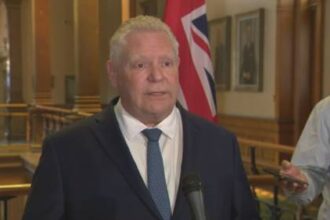In a dramatic development that has sent ripples through Toronto’s law enforcement community, a veteran police officer has resigned just days before facing a scheduled misconduct hearing related to domestic violence allegations. The officer, who had previously been given what tribunal documents described as a “last chance” to maintain his position on the force, opted to leave the service rather than face potential dismissal.
The resignation marks the culmination of a troubling sequence of events that began when the officer, a 15-year member of the Toronto Police Service, was charged with assault and uttering threats following an incident involving his domestic partner in 2021. According to documents filed with the Toronto Police disciplinary tribunal, the officer had violated conditions of his previous disciplinary agreement that explicitly prohibited him from engaging in any further misconduct.
“When officers breach the public’s trust, particularly in cases involving domestic violence, it undermines the very foundation of policing,” said Wendy Gillis, a police accountability expert interviewed by CO24. “The resignation before a hearing often leaves many questions unanswered for both the alleged victims and the community at large.”
The officer’s departure represents what many police oversight advocates describe as a concerning pattern where officers facing serious misconduct allegations resign before formal disciplinary proceedings can conclude. This effectively halts the disciplinary process, as the Police Services Act loses jurisdiction once an officer is no longer employed by the force.
Court records reveal that while criminal charges were eventually withdrawn in the criminal justice system, the police service’s Professional Standards Unit continued its investigation, ultimately leading to the scheduled misconduct hearing. The incident had been classified as “discreditable conduct” under the Police Services Act.
Toronto Police Association representatives declined to comment specifically on this case but noted in a statement that “all members deserve due process through established procedures.” Meanwhile, anti-violence advocates have expressed frustration that the resignation means a public hearing with full disclosure of allegations will not take place.
The Toronto Police Service has faced increasing scrutiny in recent years regarding how it handles allegations of domestic violence within its ranks. A 2020 internal review recommended enhanced screening processes and more rigorous supervision for officers previously disciplined for personal conduct issues.
Chief Myron Demkiw has previously pledged to strengthen accountability measures within the force, telling the Police Services Board last year that “maintaining public confidence requires that we hold ourselves to the highest standards of conduct both professionally and personally.”
For the alleged victim, whose identity is protected under privacy provisions, the officer’s resignation may bring a sense of closure but raises questions about accountability within law enforcement institutions. Victim advocacy groups have called for reforms to ensure that police officers facing serious misconduct allegations cannot simply resign to avoid public scrutiny of their actions.
As Toronto continues to grapple with issues of police accountability and transparency, this case highlights the delicate balance between officers’ employment rights and the public’s right to oversight of those entrusted with extraordinary powers. What meaningful reforms could prevent similar situations in the future, where officers facing serious allegations can effectively circumvent the full disciplinary process by resigning?























